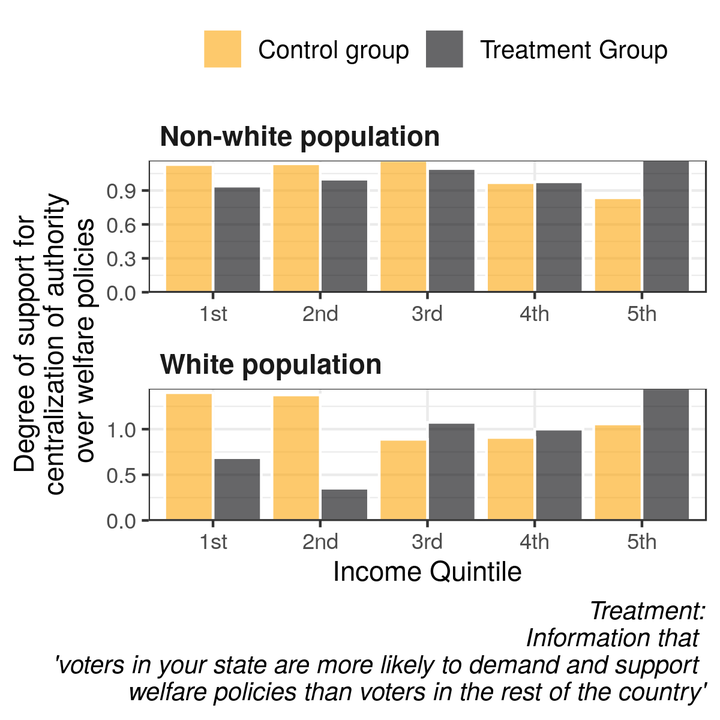Information, Income Distribution, and Policy Preferences

Classical theories about public preferences for the allocation of political authority in multilevel polities emphasize the role of economic conditions, identity, and nationalist/regionalist values. In developed nations, immigration has played a significant role in public attitudes about supra-national integration.
This project seeks to understand how information about inequality and income distribution affect political attitudes about welfare policies and political integration. How do different social groups process information about inequality? How does that information change their perception about their social and political environment? How do perceptions affect political attitudes and ideological positions?
As a part of this project, I have conducted a nation-wide survey experiment in 2018-2019 in Brazil with other collaborators to investigate the reaction of various groups to different types of information about the distribution of income and inequality. Preliminary results show that people, particularly from the middle class, tend to act as if demand for redistribution led to an increase in welfare state efforts. So, information about the distribution of income make people adjust their belief about the demand for redistribution and, as a consequence, strengthen their support (opposition) to redistributive policies and parties with redistributive programs.
Not only that. Information about state-level demand for redistribution makes high-income groups more centralist (favor centralization of political authority). Poor population, on the other hand, support more decentralization when they receive the same information. An interesting finding is that the effect of information is stronger among the white population because this population perceive that they and, therefore, other groups as well, can influence political decisions. On the other hand, the attitudes of non-white population, who feel marginalized from the political process, are less affected by information about inequality and demand for welfare policies.
Some related working papers:
- Public Policy Preferences, Redistribution, and Support for Welfare Integration in Multilevel Polities: a Survey Experiment in Brazil

Classical theories about public preferences for the allocation of political authority in multilevel polities emphasize the role of economic conditions, identity, and nationalist/regionalist values. In developed nations, immigration has played a significant role in public attitudes about supra-national integration.
This project seeks to understand how information about inequality and income distribution affect political attitudes about welfare policies and political integration. How do different social groups process information about inequality? How does that information change their perception about their social and political environment? How do perceptions affect political attitudes and ideological positions?
As a part of this project, I have conducted a nation-wide survey experiment in 2018-2019 in Brazil with other collaborators to investigate the reaction of various groups to different types of information about the distribution of income and inequality. Preliminary results show that people, particularly from the middle class, tend to act as if demand for redistribution led to an increase in welfare state efforts. So, information about the distribution of income make people adjust their belief about the demand for redistribution and, as a consequence, strengthen their support (opposition) to redistributive policies and parties with redistributive programs.
Not only that. Information about state-level demand for redistribution makes high-income groups more centralist (favor centralization of political authority). Poor population, on the other hand, support more decentralization when they receive the same information. An interesting finding is that the effect of information is stronger among the white population because this population perceive that they and, therefore, other groups as well, can influence political decisions. On the other hand, the attitudes of non-white population, who feel marginalized from the political process, are less affected by information about inequality and demand for welfare policies.
Some related working papers:
- Public Policy Preferences, Redistribution, and Support for Welfare Integration in Multilevel Polities: a Survey Experiment in Brazil
